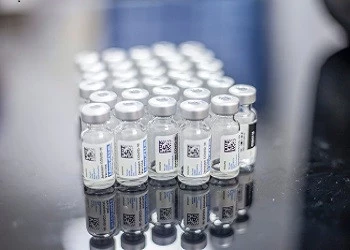This week’s big story: BioNTech's new facility for vaccine production in Africa
The German pharma giant is set to produce vaccines inside shipping containers to meet the needs of African countries
Add bookmark
BioNTech has announced it is developing its first modular manufacturing facility to produce vaccines from within shipping containers. The “BioNTainers” will be equipped to produce mRNA-based vaccines targeted to the needs of African countries, for example the Pfizer-BioNTech Covid-19 vaccine and BioNTech’s investigational malaria and tuberculosis vaccines, pending approval.
Each BioNTainer will be a clean room which BioNTech is equipping with vaccine manufacturing solutions. The six individual containers will allow for mRNA vaccine production in bulk.
According to BioNTech, the initiative could help produce up to 50 million doses of the Pfizer-BioNTech Covid-19 vaccine each year, with the possibility of scaling this up further by adding extra modules.
Work on the first BioNTainer is expected to be completed in the second half of 2022 and facilities are planned for Senegal, Rwanda and potentially South Africa. Additionally, a new BioNTech project in Ghana will support manufacturing with fill-and-finish capacities.
Scalable facilities
Vaccines produced at these sites are expected to be dedicated to domestic use and for other member states of the African Union at a not-for-profit price.
The announcement has been welcomed by policymakers across Africa. Nana Akufo-Addo, President of the Republic of Ghana, said: “Today represents a momentous day for Mother Africa. Another step in the process towards self-reliance has been taken, and I thank the German biotechnology company, BioNTech and the kENUP Foundation for their contribution to this end.
“We want to achieve self-sufficiency in vaccine production to meet future national, regional and continental needs for health security. Ghana reaffirms her determination to make this Pan-African vaccine project work and succeed,” he added.
The World Health Organization (WHO) also welcomed the news, with director-general Dr Tedros Adhanom Ghebreyesus commenting: “The WHO is committed to working with all partners to ensure every country can access vaccines and other tools to protect the health of their populations. We can only achieve that goal through genuine cooperation on local vaccine development, production, distribution and uptake, through greater diversity of platforms.”
Vaccine inequity
Oxfam, however, as a member of the People’s Vaccine Alliance, was critical of the news. Oxfam’s health policy manager, Anna Marriott, said: “Efforts to boost vaccine manufacturing in Africa are welcome but this is a long-term project and should not distract from the failure of rich country governments and companies, including Germany and BioNTech, to tackle today’s shameful vaccine inequality responsible for millions of needless deaths in poorer countries from this pandemic.
“It is unacceptable that BioNTech, along with other pharma giants, is ignoring the WHO’s mRNA Hub in Africa which is ready to produce vaccines and expand manufacturing in favour of a BioNTech-controlled vaccine container module that won’t be producing vaccines for well over a year.
“To date, Germany has exported just one percent of its vaccines to the African continent. If Germany is serious about tackling vaccine inequality it must reverse its refusal to support the waiving of intellectual property rules for these life-saving pandemic tools and insist BioNTech transfer their technology now to the World Health Organization so that existing manufacturers across Africa, Latin America and Asia can make them.”
Also in the news:
- Catalent is expanding its Shanghai temperature-controlled facilities for clinical supply services by around 2,800 square meters.
- Logistics company DHL is investing more than $400 million to expand its pharmaceutical supply network by around 27 percent.
- Avantor is opening a new distribution center in Ireland later in 2022 to meet the growing demand for production materials by the country’s biopharma industry.
- Cold weather may be affecting the accuracy of rapid Covid-19 tests shipped to people’s homes, according to a professor of epidemiology at the University of Florida.
Get exclusive access to member-only articles, reports, videos, interviews, webinars and other premium content from industry experts and thought leaders by signing up to Pharma Logistics IQ here.















